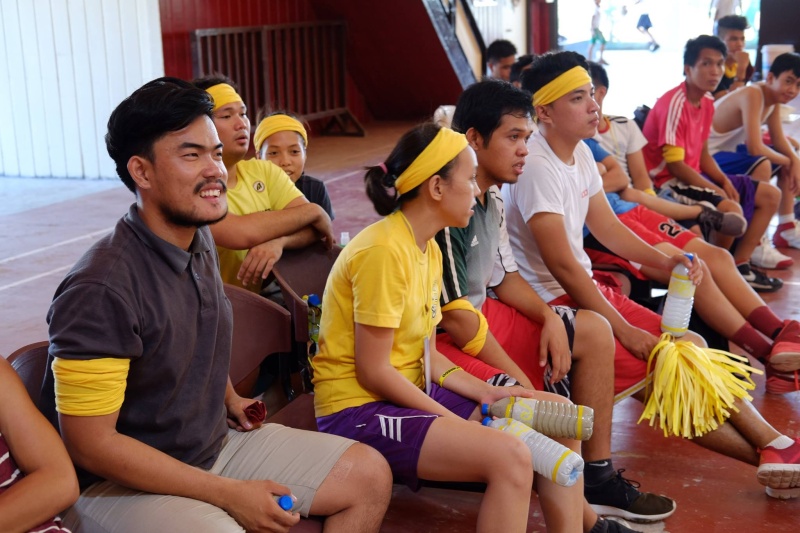
May 13, 2016 | Focolare Worldwide
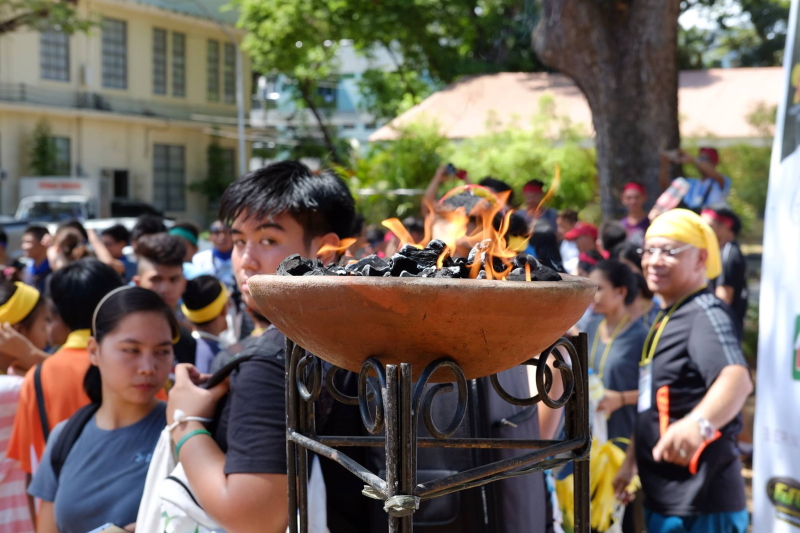 Political involvement in the Philippines, especially among younger age groups, has always been a key issue. Over the years, the Focolare Movement has promoted events that encourage active involvement in the democratic process for the building of a more fair just country. A few days away the from election, on May 12-14, 2016, a Run4Unity event is being held by the young people and teenagers of the Focolare Movement with the stated intention of strengthening ties with society. In the local dialect it is titled “Dula Napud Ta Bai”, which means “Let’s play, friend”, abbreviated “DULA TA Bai”. Joops Miranda, one of the young organizers, writes: “The event is meant to promote awareness of each individual’s ability to become a catalyst of a more united world. It wishes to help strengthen interpersonal relationships and to build new ones. It aims at encouraging dialgogue about current issues amongst young people from different communities, in a setting where they can also have fun! We hope to accomplish this goal through the many sport and recreational activities that will be offered. This underscores our final goal, which is to unite people of different ethnic origins, nationalities and religious beliefs . . . to become a family.”
Political involvement in the Philippines, especially among younger age groups, has always been a key issue. Over the years, the Focolare Movement has promoted events that encourage active involvement in the democratic process for the building of a more fair just country. A few days away the from election, on May 12-14, 2016, a Run4Unity event is being held by the young people and teenagers of the Focolare Movement with the stated intention of strengthening ties with society. In the local dialect it is titled “Dula Napud Ta Bai”, which means “Let’s play, friend”, abbreviated “DULA TA Bai”. Joops Miranda, one of the young organizers, writes: “The event is meant to promote awareness of each individual’s ability to become a catalyst of a more united world. It wishes to help strengthen interpersonal relationships and to build new ones. It aims at encouraging dialgogue about current issues amongst young people from different communities, in a setting where they can also have fun! We hope to accomplish this goal through the many sport and recreational activities that will be offered. This underscores our final goal, which is to unite people of different ethnic origins, nationalities and religious beliefs . . . to become a family.” 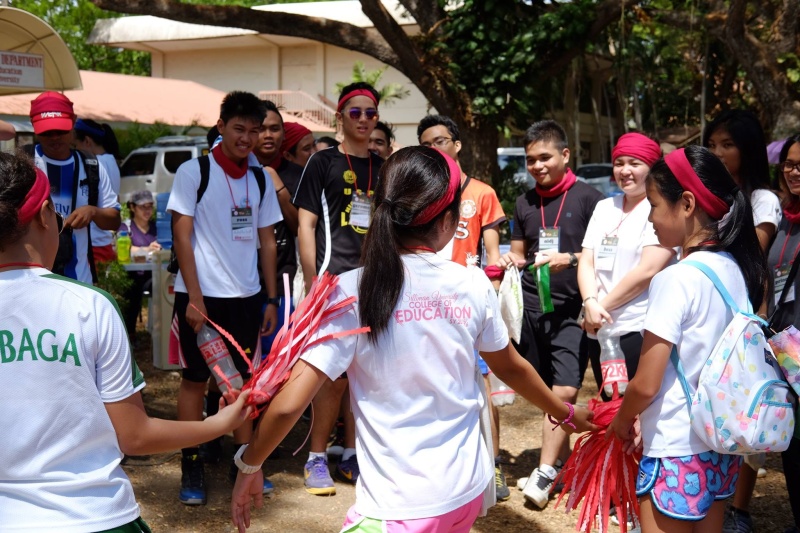 Where did the idea for Dula Ta Bai come from? Joops explains: “In the summer of 2014, we and some friends were wondering how we could avoid wasting another summer sitting in front of a computer screen, playing on our personal tablet. The initial idea came in this way: we were chatting with each other: Why not spend a whole day (which then became three days) doing different physical activities? Things that could be done together, outside in the open, inviting the local community to join us? Two months later there were 200 of us together from several parts of the Philippines. Basketball, volleyball, light exercize, football, frisbee and the ever-popular “Amazing Race” are some of the sport events offered at Dula Ta Bai. Then, the event will conclude with an evening programme called “U-Nite”, with music and story sharing.
Where did the idea for Dula Ta Bai come from? Joops explains: “In the summer of 2014, we and some friends were wondering how we could avoid wasting another summer sitting in front of a computer screen, playing on our personal tablet. The initial idea came in this way: we were chatting with each other: Why not spend a whole day (which then became three days) doing different physical activities? Things that could be done together, outside in the open, inviting the local community to join us? Two months later there were 200 of us together from several parts of the Philippines. Basketball, volleyball, light exercize, football, frisbee and the ever-popular “Amazing Race” are some of the sport events offered at Dula Ta Bai. Then, the event will conclude with an evening programme called “U-Nite”, with music and story sharing.  The young people wondered how they could develop the second event: “The renewal of our way of thinking and doing, also plays a vital part in approaching Jesus’s prayer “that all may be one” (Jn 17:21)” Joop explains. So we left room for the concept of ‘environmental conscience’ (‘Pagkabana Kalikupan’). We’re trying to respond to Pope Francis’s appeal in Laudato Si’ which reminds us of Mother Nature’s cry, and we wanted to help in promoting an itegral ecology. An integral ecology, as the Pope explains, is an ecology that isn’t concentrated only on nature while leaving out humankind and its needs, but rather includes a “human” ecology. Therefore, following this line of thought we hope to convey to the other young people the value of caring for one another (with sport, cultural, musical and artistic activities) and of caring for the environment.” Maria Chiara De Lorenzo
The young people wondered how they could develop the second event: “The renewal of our way of thinking and doing, also plays a vital part in approaching Jesus’s prayer “that all may be one” (Jn 17:21)” Joop explains. So we left room for the concept of ‘environmental conscience’ (‘Pagkabana Kalikupan’). We’re trying to respond to Pope Francis’s appeal in Laudato Si’ which reminds us of Mother Nature’s cry, and we wanted to help in promoting an itegral ecology. An integral ecology, as the Pope explains, is an ecology that isn’t concentrated only on nature while leaving out humankind and its needs, but rather includes a “human” ecology. Therefore, following this line of thought we hope to convey to the other young people the value of caring for one another (with sport, cultural, musical and artistic activities) and of caring for the environment.” Maria Chiara De Lorenzo
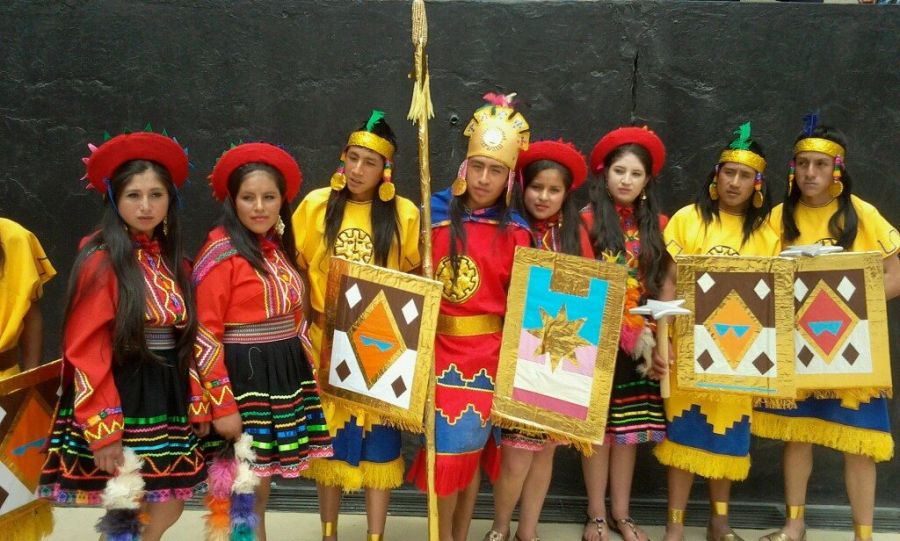
May 12, 2016 | Focolare Worldwide
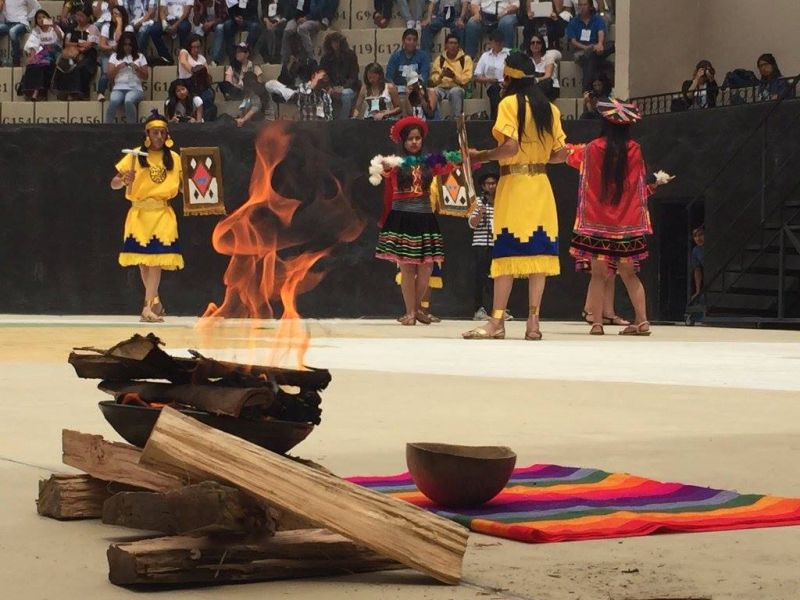 A Festival for Peace concluded United World Week in Ecuador. It was a veritable expo of fraternal actions promoted by the young people of the Focolare Movement. The account of Francesco Ricciardi from the international delegation that travelled the roads of Ecuador in an experience that powerfully brought out the communitarian vocation of the South American continent. “Traditional and modern musical instruments joined together in giving life to a real feast. Young people from Africa, Asia, Europe and the Americas took to the stage. The whole world is in Quito today!” “Even from amidst last week’s destruction, we saw a chain of generosity and solidarity emerge,” Juan Carlos reported. Many concrete experiences of after the earthquake were presented on the stage. Jesús recounts: “When we saw the first pictures, we realized the serious extent of the damages. With several friends we began to organize a collection of basic necessities. We worked from morning until the middle of the night, for love of our brothers and sisters.” Natalia continues: “We focused on areas that were devastated by the earthquake, trying to respond to the cry of suffering. At first it wasn’t clear how we could be of any help. Then I realized that I could love by listening and taking on the pain of the people I met.” David says: “I saw open hands that didn’t hesitate for a single second to give: food, water, medicine and money; hands that didn’t have anything to give, but pitched in to help. I saw an Ecuador shattered by desperation, thirst and fear. But I saw faces of joy, satisfaction and hope at receiving such selfless assistance. I worked beside people who left everything behind: the job, school and even their own family to help people who had lost everything. I got a close up look at the goodness of the Ecuadorians and others.”
A Festival for Peace concluded United World Week in Ecuador. It was a veritable expo of fraternal actions promoted by the young people of the Focolare Movement. The account of Francesco Ricciardi from the international delegation that travelled the roads of Ecuador in an experience that powerfully brought out the communitarian vocation of the South American continent. “Traditional and modern musical instruments joined together in giving life to a real feast. Young people from Africa, Asia, Europe and the Americas took to the stage. The whole world is in Quito today!” “Even from amidst last week’s destruction, we saw a chain of generosity and solidarity emerge,” Juan Carlos reported. Many concrete experiences of after the earthquake were presented on the stage. Jesús recounts: “When we saw the first pictures, we realized the serious extent of the damages. With several friends we began to organize a collection of basic necessities. We worked from morning until the middle of the night, for love of our brothers and sisters.” Natalia continues: “We focused on areas that were devastated by the earthquake, trying to respond to the cry of suffering. At first it wasn’t clear how we could be of any help. Then I realized that I could love by listening and taking on the pain of the people I met.” David says: “I saw open hands that didn’t hesitate for a single second to give: food, water, medicine and money; hands that didn’t have anything to give, but pitched in to help. I saw an Ecuador shattered by desperation, thirst and fear. But I saw faces of joy, satisfaction and hope at receiving such selfless assistance. I worked beside people who left everything behind: the job, school and even their own family to help people who had lost everything. I got a close up look at the goodness of the Ecuadorians and others.”  Some artistic offerings made the celebration even more pleasant and helped to enhance the testimonies. Melany recounts: “When I began to sing in the university chorus I realized that, to have a place in the chorus my friends hadn’t hesitated to offend and insult others. One day, I decided to share the songs I had written. It was a first step. Since then everything has changed. Others have also begun to share their hidden talents that they are finally able to display without fear! The relationship among us all has very much improved. On May 8, 2015 we put together a concert of Latin American music with the goal of transmitting the value of fraternity.” Lebanese young people Giorgio and Lara, even though immersed in one of the bloodiest wars in history, found the strength to love everyone: “The war in Syria has produced 6.5 million refugees inside the country and 3 million have fled to neighbouring countries. Nevertheless, hundreds of public rallies have been held throughout the Middle East to raise funds and supplies of all sorts, and to give a joint witness as Christians and Muslims that unity is possible. Concerts, feasts and prayer vigils have transformed the feast into hope, hatred into pardon and revenge into peace. So many families with such poor financial resources have taken in Iraqi refugees. In Syria many have said to us: “Love conquers all, even when that seems impossible.” David and Catalina presented the “Peace Schools”, a programme promoted in collaboration with Sophia University Institute: “The objective is to create spaces of formation in the theory and practice of fraternity, strengthening relationships with oneself, others, Creation, objects and with transcendence. Universal brotherhood could create a politics that is at the service of all: an economy based on communion; a balanced ecology: a world that is everyone’s home.” The programme is one of the concrete efforts of the United World Project. The festival of inculturation concluded with Samiy, an indigenous young person from the Kitu Kara community: “We’ve spent a week together in which we have experienced that it is possible to bring fraternity, unity, solidarity and peace into our lives, into our local environments and into our world. Humankind is alive. Our commitment is personal, but we can do it only if we feel that we are part of a community. Today we were witnesses to the beauty and diversity and the richness of the cultures.” The joy was irrepressible. During the final song everyone inside the arena was dancing! Young and old, children and teenagers: everyone dancing for joy. But it was no fleeting joy, but the awareness that we are many, a single people with Love for its banner. And as Lidia and Walter said: “This is no conclusion. This is only the beginning!” Source: Città Nuova online
Some artistic offerings made the celebration even more pleasant and helped to enhance the testimonies. Melany recounts: “When I began to sing in the university chorus I realized that, to have a place in the chorus my friends hadn’t hesitated to offend and insult others. One day, I decided to share the songs I had written. It was a first step. Since then everything has changed. Others have also begun to share their hidden talents that they are finally able to display without fear! The relationship among us all has very much improved. On May 8, 2015 we put together a concert of Latin American music with the goal of transmitting the value of fraternity.” Lebanese young people Giorgio and Lara, even though immersed in one of the bloodiest wars in history, found the strength to love everyone: “The war in Syria has produced 6.5 million refugees inside the country and 3 million have fled to neighbouring countries. Nevertheless, hundreds of public rallies have been held throughout the Middle East to raise funds and supplies of all sorts, and to give a joint witness as Christians and Muslims that unity is possible. Concerts, feasts and prayer vigils have transformed the feast into hope, hatred into pardon and revenge into peace. So many families with such poor financial resources have taken in Iraqi refugees. In Syria many have said to us: “Love conquers all, even when that seems impossible.” David and Catalina presented the “Peace Schools”, a programme promoted in collaboration with Sophia University Institute: “The objective is to create spaces of formation in the theory and practice of fraternity, strengthening relationships with oneself, others, Creation, objects and with transcendence. Universal brotherhood could create a politics that is at the service of all: an economy based on communion; a balanced ecology: a world that is everyone’s home.” The programme is one of the concrete efforts of the United World Project. The festival of inculturation concluded with Samiy, an indigenous young person from the Kitu Kara community: “We’ve spent a week together in which we have experienced that it is possible to bring fraternity, unity, solidarity and peace into our lives, into our local environments and into our world. Humankind is alive. Our commitment is personal, but we can do it only if we feel that we are part of a community. Today we were witnesses to the beauty and diversity and the richness of the cultures.” The joy was irrepressible. During the final song everyone inside the arena was dancing! Young and old, children and teenagers: everyone dancing for joy. But it was no fleeting joy, but the awareness that we are many, a single people with Love for its banner. And as Lidia and Walter said: “This is no conclusion. This is only the beginning!” Source: Città Nuova online
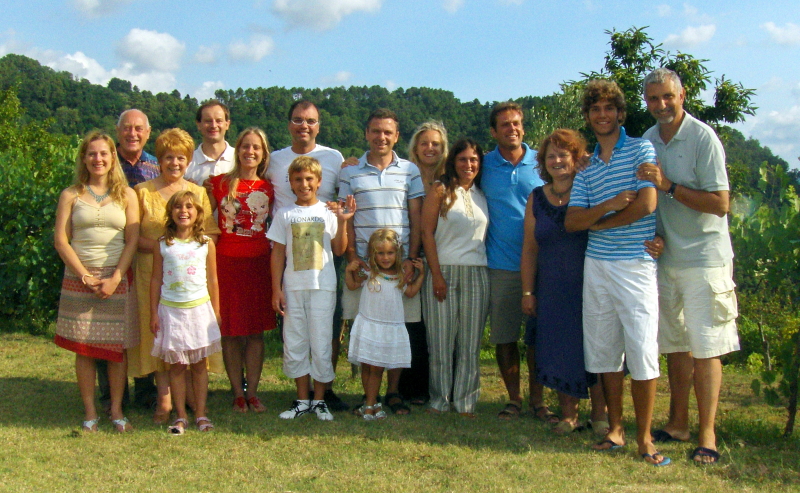
May 11, 2016 | Focolare Worldwide
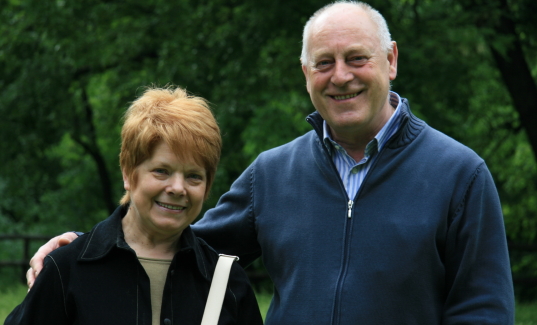 “A family’s history is beset by all types of crises.” This was how Pope Francis introduced his speech on the crisis of couples described in Amoris Laetitia (AL 232 and ff.), thus interpreting the various phases with great realism. These pages seem to recount my story, of when as a child of five, I lost my father and was impoverished by the lack of a future, and when, as a young man, I found in the love of a girl, a breath of new life and hope for happiness and then, as a disillusioned person, I found myself alone. But it is also the story of a community that welcomed and saved me. After Renzo’s nautical studies he embarked on the ships of the Mercantile Marines, and during a leave, met Mariarosa and love bloomed. It was such a great sentiment that could not accept distances. He left his maritime job for her, and his new job led him to live far from their families, friends, and the usual life. The entire universe enfolded the two of them in a dream, and both put their bets on happiness with one another. All went well until when our differences, attractive at the start, slowly started to disturb our harmony. It reached the point that they seemed unacceptable, and made us feel like strangers to one another, in the conviction that we had chosen the wrong person. And in the bitter disappointment we admitted that the dream had ended, along with our marriage. So we split up and I found myself alone in an empty house, giving in to anger and despair.
“A family’s history is beset by all types of crises.” This was how Pope Francis introduced his speech on the crisis of couples described in Amoris Laetitia (AL 232 and ff.), thus interpreting the various phases with great realism. These pages seem to recount my story, of when as a child of five, I lost my father and was impoverished by the lack of a future, and when, as a young man, I found in the love of a girl, a breath of new life and hope for happiness and then, as a disillusioned person, I found myself alone. But it is also the story of a community that welcomed and saved me. After Renzo’s nautical studies he embarked on the ships of the Mercantile Marines, and during a leave, met Mariarosa and love bloomed. It was such a great sentiment that could not accept distances. He left his maritime job for her, and his new job led him to live far from their families, friends, and the usual life. The entire universe enfolded the two of them in a dream, and both put their bets on happiness with one another. All went well until when our differences, attractive at the start, slowly started to disturb our harmony. It reached the point that they seemed unacceptable, and made us feel like strangers to one another, in the conviction that we had chosen the wrong person. And in the bitter disappointment we admitted that the dream had ended, along with our marriage. So we split up and I found myself alone in an empty house, giving in to anger and despair.

1971: As a young couple with the first 5 children

Renzo and Maria Rosa with the whole family
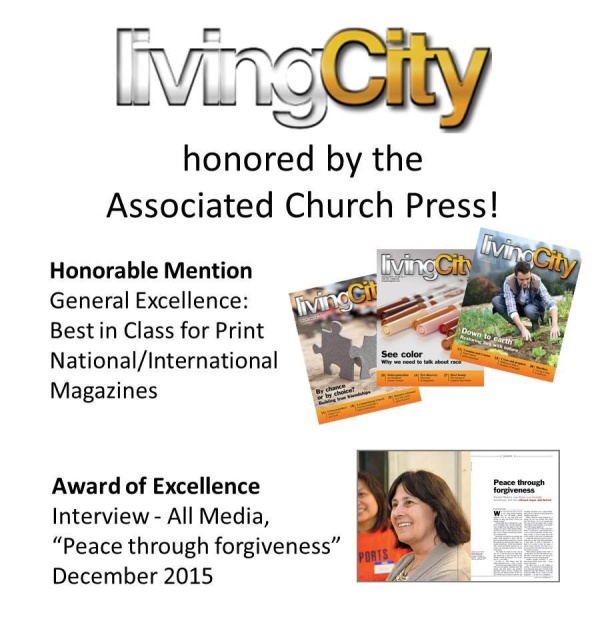
May 10, 2016 | Non categorizzato
 On 5 May 2016, The Associated Church Press (Florida) conferred on Living City Magazine two awards for last year’s February, April and October issues. It received an Honourable Mention in the category “Best in Class National/International print magazines, directed to a broad audience” (Christian Century and Sojourners were the other award recipients in this category). The judges appreciated the “strong use of colour on front covers” and the full bleed and full page pictures. For the writing, they found the first person pieces the most engaging. “Unique perspectives and a strong focus on the magazine’s purpose makes for an original and interesting magazine. Good work,” was their comment. In the category “Reporting and Writing: interview (all media)”, Living City received an Award of Excellence for the article “Peace through forgiveness” published in the December 2015 issue, written by Jade Giacobbe after an encounter with Rahel Muha, whose son was murdered in 1999 at age 18. The judges wrote, “This would be a heart-breaking story were it not for the emphasis on forgiveness, and the mother providing a powerful testimony … A well-crafted story. Good can spring from evil with the proper approach to forgiveness.”
On 5 May 2016, The Associated Church Press (Florida) conferred on Living City Magazine two awards for last year’s February, April and October issues. It received an Honourable Mention in the category “Best in Class National/International print magazines, directed to a broad audience” (Christian Century and Sojourners were the other award recipients in this category). The judges appreciated the “strong use of colour on front covers” and the full bleed and full page pictures. For the writing, they found the first person pieces the most engaging. “Unique perspectives and a strong focus on the magazine’s purpose makes for an original and interesting magazine. Good work,” was their comment. In the category “Reporting and Writing: interview (all media)”, Living City received an Award of Excellence for the article “Peace through forgiveness” published in the December 2015 issue, written by Jade Giacobbe after an encounter with Rahel Muha, whose son was murdered in 1999 at age 18. The judges wrote, “This would be a heart-breaking story were it not for the emphasis on forgiveness, and the mother providing a powerful testimony … A well-crafted story. Good can spring from evil with the proper approach to forgiveness.”
Susanne Janssen
Living City Magazine
Award-winning article: https://livingcitymagazine.com/peace-through_forgiveness
May 10, 2016 | Non categorizzato
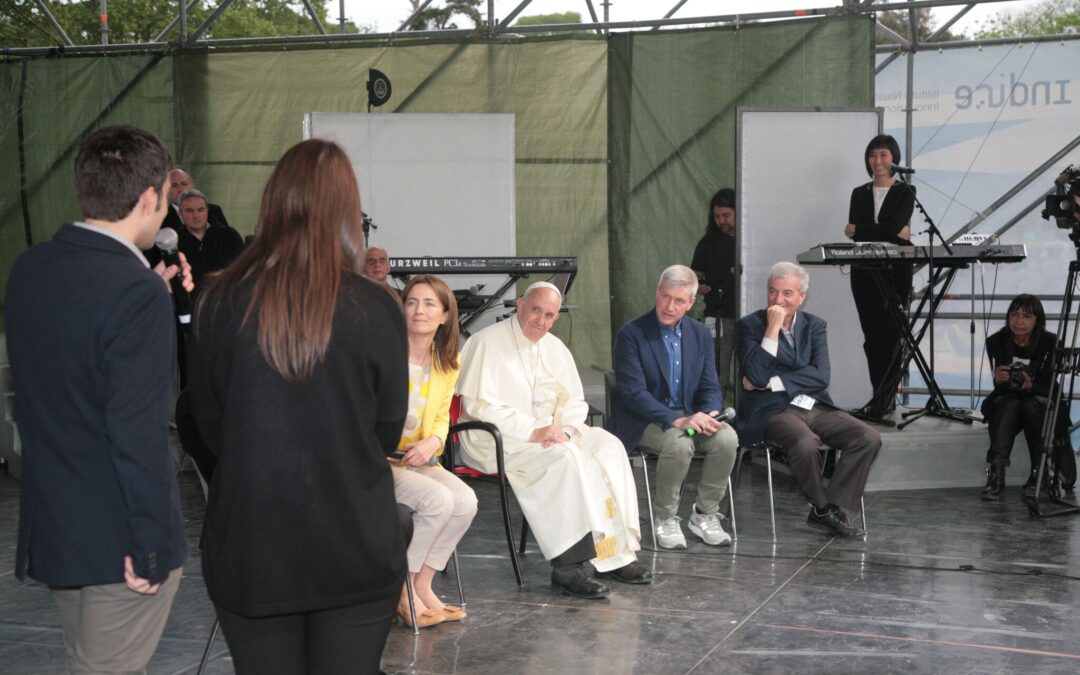
May 10, 2016 | Non categorizzato
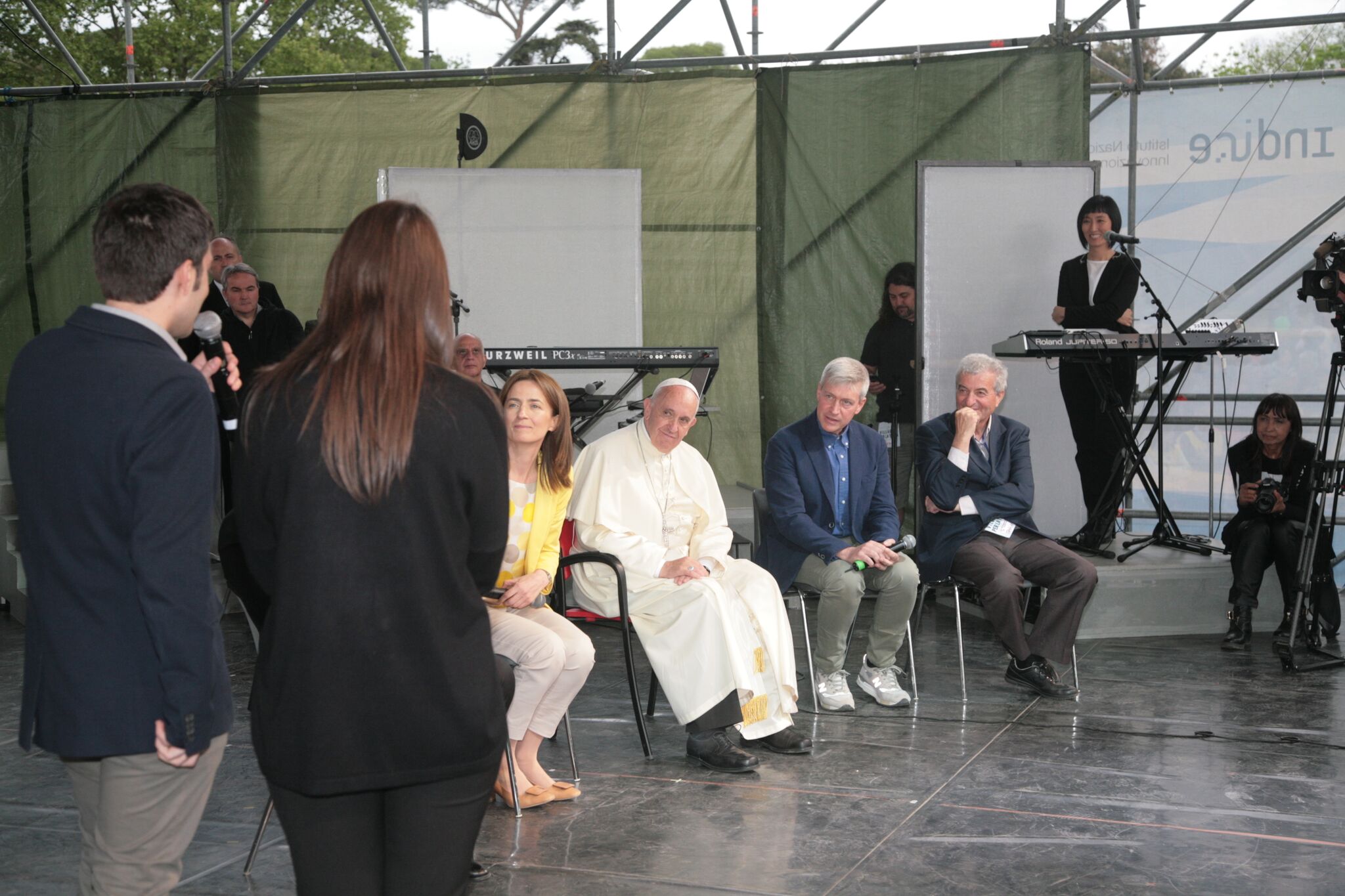 “We felt strongly that we wanted to immerse ourselves in the wounds of our city. We became inolved with Patrizia, a teacher and collaborator of Città Nuova magazine, who was writing a book about the children of prisoners and she had just met the Break the Wall Committee. This committee consists of 7 prisoners who were working to allow children to have a bit more than cold meetings with their fathers in large empty rooms. They wanted to hold celebrations and events that would leave the children with a happy memory of their fathers from whom they were separated. A collaboration of mutual trust was immediately established between us, the inmates on the committee, the teachers and the director. The first meeting with the prisoners took place at Christmas 2014. I was struck when the police ordered us to leave all our personal possessions behind before crossing the prison gate. We took his words to mean our prejudices as well. The detainees couldn’t believe that so many young people would spend a Saturday morning with them. Since the day of that celebration something more than a volunteer programme began: a true and deep relationship with the detainees themselves.As we described what we were doing, one of them remarked that it took a lot of courage. But for us it was a matter of trust in others even though they had committed a crime and of hope that they can change and begin again. We remember the joy of that detainee who was glad to be able to invest his talents in something legal that was not for profit – as were the illegal activities that he had been engaged in before. For him who had no children of his own, working for the children filled him with a sense of satisfaction. Last year we met with the detainees on the committee to plan another event. A thank you note they wrote conveys their joy and enthusiasm over that meeting where we were able to sit down together as if we weren’t inside the walls of a prison. We also had a snack together, yes, because they gave us a warm welcome as you would among old friends. Now they call us ‘the kids on the external committee’. At that meeting they opened up and shared with us the practical effects of inprisonment on their daily life. For example, they said that people in prison aren’t able to bring the background into focus; their eyes need to reacquire the ability to look ahead, having lost the possibility to see the horizon. One of them said goodbye to us in a note; “To the youngsters I say continue to dedicate yourselves to this activity, because often the ones who are inside need only to see that there is someone on the outside who is interested in our problems so they can have a second chance. On my part, I thank you for that.” Last March, for Father’s Day, we organised games and other activities in the mornings and afternoons. Half a day of simple things that allowed their usually divided families to spend some time together, and for their children to cherish fond memories in the area of the so delicate and difficult relationships with their fathers. Some of them were present during the visit Pope Francis made on Holy Thursday last year, and they attrended the Mass and told us how moving it was for them. It has remained a precious memory for them. They often tell us that ‘Prison takes away your feelings along with your freedom’. But perhaps now something has changed: there’s the joy of meeting and working together without any prejudice. In them we’ve discovered the face of Jesus the prisoner, Jesus the marginalised. Every time we’re leaving Rebibbia Prison we feel that we’ve learnt to have the courage to change, to admit our own mistakes and to begin again.We feel God’s personal love and His immense Mercy.”
“We felt strongly that we wanted to immerse ourselves in the wounds of our city. We became inolved with Patrizia, a teacher and collaborator of Città Nuova magazine, who was writing a book about the children of prisoners and she had just met the Break the Wall Committee. This committee consists of 7 prisoners who were working to allow children to have a bit more than cold meetings with their fathers in large empty rooms. They wanted to hold celebrations and events that would leave the children with a happy memory of their fathers from whom they were separated. A collaboration of mutual trust was immediately established between us, the inmates on the committee, the teachers and the director. The first meeting with the prisoners took place at Christmas 2014. I was struck when the police ordered us to leave all our personal possessions behind before crossing the prison gate. We took his words to mean our prejudices as well. The detainees couldn’t believe that so many young people would spend a Saturday morning with them. Since the day of that celebration something more than a volunteer programme began: a true and deep relationship with the detainees themselves.As we described what we were doing, one of them remarked that it took a lot of courage. But for us it was a matter of trust in others even though they had committed a crime and of hope that they can change and begin again. We remember the joy of that detainee who was glad to be able to invest his talents in something legal that was not for profit – as were the illegal activities that he had been engaged in before. For him who had no children of his own, working for the children filled him with a sense of satisfaction. Last year we met with the detainees on the committee to plan another event. A thank you note they wrote conveys their joy and enthusiasm over that meeting where we were able to sit down together as if we weren’t inside the walls of a prison. We also had a snack together, yes, because they gave us a warm welcome as you would among old friends. Now they call us ‘the kids on the external committee’. At that meeting they opened up and shared with us the practical effects of inprisonment on their daily life. For example, they said that people in prison aren’t able to bring the background into focus; their eyes need to reacquire the ability to look ahead, having lost the possibility to see the horizon. One of them said goodbye to us in a note; “To the youngsters I say continue to dedicate yourselves to this activity, because often the ones who are inside need only to see that there is someone on the outside who is interested in our problems so they can have a second chance. On my part, I thank you for that.” Last March, for Father’s Day, we organised games and other activities in the mornings and afternoons. Half a day of simple things that allowed their usually divided families to spend some time together, and for their children to cherish fond memories in the area of the so delicate and difficult relationships with their fathers. Some of them were present during the visit Pope Francis made on Holy Thursday last year, and they attrended the Mass and told us how moving it was for them. It has remained a precious memory for them. They often tell us that ‘Prison takes away your feelings along with your freedom’. But perhaps now something has changed: there’s the joy of meeting and working together without any prejudice. In them we’ve discovered the face of Jesus the prisoner, Jesus the marginalised. Every time we’re leaving Rebibbia Prison we feel that we’ve learnt to have the courage to change, to admit our own mistakes and to begin again.We feel God’s personal love and His immense Mercy.”
May 9, 2016 | Focolare Worldwide
Itinerary:
- Welcome celebration at Mariapolis Piero
- May 17-20: School of Inculturation
- May 21-22: New Families Pan-African Meeting
- May 25: Visit to the Academic Council of the Catholic University of Eastern Africa (CUEA)
- May 27: Presentation at the Ecumenical Commission
- May 28-29: Meeting with the Focolare communities from Burundi, Rwanda, Uganda and Tanzania, and inauguration of Mary of the Light Church in Kenya.
May 9, 2016 | Non categorizzato
In the Year of Mercy, Consecrated Women who belong to the Focolare Movement will hold a week of Spiritual Exercises at their Casa Emmaus Centre in the Focolare town of Loppiano, Italy. “It will be an opportunity for the women to deepen their own charisms in the light of the spirituality of unity,” explains Sister Antonia Moioli, “and in this context to experience the relationship that exists amongst the charisms. Brochure
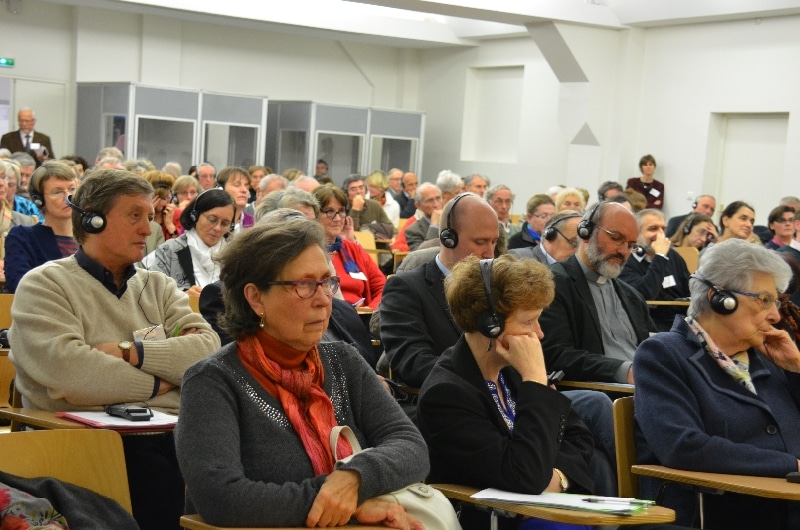
May 9, 2016 | Focolare Worldwide
 “Resignation and weariness do not belong to the soul of Europe; even our problems can become powerful forces of unity” For the majority of Europeans, May 9 is an occasion to celebrate the values of integration, unity and peace, as this date marks the anniversary of the historical Schuman declaration that gave birth to the European Union; but for others it marks the time when Stalin declared victory over Germany on May 9, 1945 and rights started to be deprived under the Soviet rule. The innovative process of integration, which Europe dared to start sixty years ago, should be confronted against this historical background even today. Considering the present crisis and the contradictions inherent in the cultural and social paradigms that peoples in Europe are experiencing, one is bound to ask: is the European experience still valid? Do Europeans still want to be together? For Pasquale Ferrara, a diplomat, a scholar and a lecturer in International Relations and Diplomacy, “the European vision of integration – which consists of bringing together not so much the leaderships, but the political will of the different countries to govern jointly over phenomena that are beyond control of individual states – is still one of great insight”. Through integration “Europe demonstrates that even today multilateralism can have an added value if attention is not centred on the state but on the political function it performs to provide for the needs of its citizens in a global and transnational world”.
“Resignation and weariness do not belong to the soul of Europe; even our problems can become powerful forces of unity” For the majority of Europeans, May 9 is an occasion to celebrate the values of integration, unity and peace, as this date marks the anniversary of the historical Schuman declaration that gave birth to the European Union; but for others it marks the time when Stalin declared victory over Germany on May 9, 1945 and rights started to be deprived under the Soviet rule. The innovative process of integration, which Europe dared to start sixty years ago, should be confronted against this historical background even today. Considering the present crisis and the contradictions inherent in the cultural and social paradigms that peoples in Europe are experiencing, one is bound to ask: is the European experience still valid? Do Europeans still want to be together? For Pasquale Ferrara, a diplomat, a scholar and a lecturer in International Relations and Diplomacy, “the European vision of integration – which consists of bringing together not so much the leaderships, but the political will of the different countries to govern jointly over phenomena that are beyond control of individual states – is still one of great insight”. Through integration “Europe demonstrates that even today multilateralism can have an added value if attention is not centred on the state but on the political function it performs to provide for the needs of its citizens in a global and transnational world”.  “A Europe that is able to stay together and thus rediscover what more can be done for the world in a better way” – these words of Maria Voce summerize the Focolare Movement’s perspective while contributing towards ongoing processes in Europe. An example of this commitment is “Together for Europe”, which brings together more than 300 communities and movements that belong to different Christian Churches. These form a network which pursues shared goals and promotes a culture of reciprocity, which stimulates individuals and peoples to welcome and get to know each other, to be reconciled and to offer mutual support. “’Together for Europe’ is not an end in itself, but its nature is exquisitely political in the noblest sense of the word: it strives for the good of that part of humanity which is Europe; it aims at the revival of its roots and at its awareness to contribute to the rest of the world” . “Together for Europe” is organizing a European event that will take place in Munich from June 30 to July 2, 2016. During the first two days, 36 round tables and forums will offer the opportunity to share experiences and views on issues concerning Europe. An outdoor rally will conclude the event on the third day. Pope Francis and the Ecumenical Patriarch Bartholomew I will be present through their video messages. Jean-Claude Junker, President of the European Commission, and Thorbjørn Jagland, Secretary General of the Council of Europe, granted their patronage. (http://www.together4europe.org/). “At a time when Europe is mostly needed, the more it seems to lack the ability to face these challenges”, comments Ferrara, while referring to the lack of political figures with a broad vision. He concludes: “But, are we looking in the wrong direction? Maybe we think that one or more political leaders are needed, while instead we must give more value to civil society, focusing more on youth and their social and political creativity, on their ability to imagine the “Old” continent as a “new” one”. Source: Press releases
“A Europe that is able to stay together and thus rediscover what more can be done for the world in a better way” – these words of Maria Voce summerize the Focolare Movement’s perspective while contributing towards ongoing processes in Europe. An example of this commitment is “Together for Europe”, which brings together more than 300 communities and movements that belong to different Christian Churches. These form a network which pursues shared goals and promotes a culture of reciprocity, which stimulates individuals and peoples to welcome and get to know each other, to be reconciled and to offer mutual support. “’Together for Europe’ is not an end in itself, but its nature is exquisitely political in the noblest sense of the word: it strives for the good of that part of humanity which is Europe; it aims at the revival of its roots and at its awareness to contribute to the rest of the world” . “Together for Europe” is organizing a European event that will take place in Munich from June 30 to July 2, 2016. During the first two days, 36 round tables and forums will offer the opportunity to share experiences and views on issues concerning Europe. An outdoor rally will conclude the event on the third day. Pope Francis and the Ecumenical Patriarch Bartholomew I will be present through their video messages. Jean-Claude Junker, President of the European Commission, and Thorbjørn Jagland, Secretary General of the Council of Europe, granted their patronage. (http://www.together4europe.org/). “At a time when Europe is mostly needed, the more it seems to lack the ability to face these challenges”, comments Ferrara, while referring to the lack of political figures with a broad vision. He concludes: “But, are we looking in the wrong direction? Maybe we think that one or more political leaders are needed, while instead we must give more value to civil society, focusing more on youth and their social and political creativity, on their ability to imagine the “Old” continent as a “new” one”. Source: Press releases
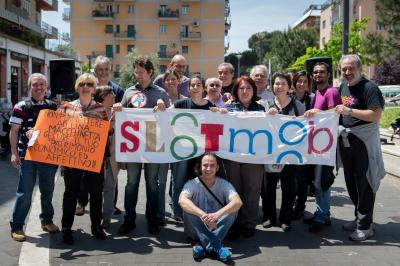
May 9, 2016 | Non categorizzato
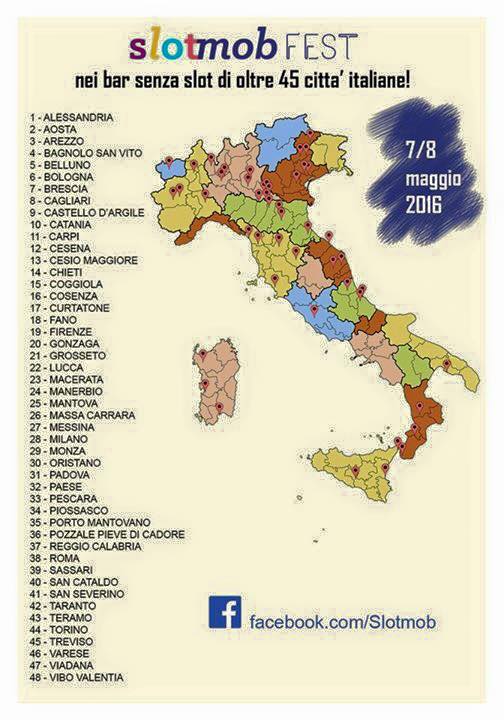 It was the summer of 2013 when an idea came up among some teenagers from Rome of doing something to curb the proliferation of gambling in the city. It was becoming more and more common to see both old and young people glued to the slot machines that are found in many Italian bars. Despite the economic crisis, in recent years the supply and consumption of gambling in Italy has increased dramatically. Italians spend 85 billion a year on the more than 50,000 latest generation slot machines, and the latest estimates are that more than 800,000 people suffer from gambling addiction. We see how the gambling business is devastating our cities, depleting the fabric of society and creating isolation and loneliness. At the helm of this exponential growth of gambling is an economic vision in which the only thing that matters is profit for the multinationals with the consent from a state that also sees it as an opportunity for profit. In front of such a bleak scene the teenagers from Rome wondered what they could do . . . and from there came the idea of rewarding the barkeepers who have chosen not to make gambling available at their establishments. They went to breakfast at their bars en masse as a Slotmob. Initially they proposed doing it in Rome and Milan, but the simple and practical idea fascinated many Italians from north to south of the peninsula. There have been 120 Slotmobs in the past two and a half years, with the participation of over 10,000 people and a network of more than 200 associations. The project has created relationships with very diverse groups, created meeting spaces, awareness and mended the social bond that gambling had disintegrated. “In Rome we concentrated our efforts on an area known as the Italian Las Vegas,” Maria Chiara explains. “In a short time a network was formed with 7 local associations that deal with different aspects of gambling. A sincere relationship was created, not without the usual difficulties of working with one another. That’s how the Let’s Not Gamble Ourselves Project began and now involves several city schools. Talking to teenagers about the power of our choices and of how we can change unjust situations beginning from ourselves, is not in fact very easy. But it actually is important to build a more just world and to involve young people in the change process.”
It was the summer of 2013 when an idea came up among some teenagers from Rome of doing something to curb the proliferation of gambling in the city. It was becoming more and more common to see both old and young people glued to the slot machines that are found in many Italian bars. Despite the economic crisis, in recent years the supply and consumption of gambling in Italy has increased dramatically. Italians spend 85 billion a year on the more than 50,000 latest generation slot machines, and the latest estimates are that more than 800,000 people suffer from gambling addiction. We see how the gambling business is devastating our cities, depleting the fabric of society and creating isolation and loneliness. At the helm of this exponential growth of gambling is an economic vision in which the only thing that matters is profit for the multinationals with the consent from a state that also sees it as an opportunity for profit. In front of such a bleak scene the teenagers from Rome wondered what they could do . . . and from there came the idea of rewarding the barkeepers who have chosen not to make gambling available at their establishments. They went to breakfast at their bars en masse as a Slotmob. Initially they proposed doing it in Rome and Milan, but the simple and practical idea fascinated many Italians from north to south of the peninsula. There have been 120 Slotmobs in the past two and a half years, with the participation of over 10,000 people and a network of more than 200 associations. The project has created relationships with very diverse groups, created meeting spaces, awareness and mended the social bond that gambling had disintegrated. “In Rome we concentrated our efforts on an area known as the Italian Las Vegas,” Maria Chiara explains. “In a short time a network was formed with 7 local associations that deal with different aspects of gambling. A sincere relationship was created, not without the usual difficulties of working with one another. That’s how the Let’s Not Gamble Ourselves Project began and now involves several city schools. Talking to teenagers about the power of our choices and of how we can change unjust situations beginning from ourselves, is not in fact very easy. But it actually is important to build a more just world and to involve young people in the change process.”  Maria Chiara continues: “The Slotmob experience is making us meet many people, many stories that show us that gambling is an open wound on our society. During one Slotmob a man that had helped us to organise some games with the young people took the microphone and told his own experience as a regular gambler. He said to us: ‘My life is made of bright spots and shadows, and what makes me gamble is the solitude. But today seeing all of you here I no longer feel alone. So I commit to stop gambling. If you see me in front of a slot machine, you’re authorised to reprimand me and remind me of this promise I make today’.” “When we look back,” Maria Chiara concludes, “we see that we’ve had unimagined results. Two laws were blocked that would have reduced the power of mayors in limiting gambling; we got a partial ban on television advertising, and increased media attention on the problem of gambling. We’re aware that we have a long road ahead of us, we’d like advertising for gambling to be completely banned and we want to re-open the discussion on whether gambling should be in the hands of multinationals. For this reason on May 7 we will be on more than 40 public squares across Italy restating our yes to a different economy and rewarding bars that have said no to gambling.”
Maria Chiara continues: “The Slotmob experience is making us meet many people, many stories that show us that gambling is an open wound on our society. During one Slotmob a man that had helped us to organise some games with the young people took the microphone and told his own experience as a regular gambler. He said to us: ‘My life is made of bright spots and shadows, and what makes me gamble is the solitude. But today seeing all of you here I no longer feel alone. So I commit to stop gambling. If you see me in front of a slot machine, you’re authorised to reprimand me and remind me of this promise I make today’.” “When we look back,” Maria Chiara concludes, “we see that we’ve had unimagined results. Two laws were blocked that would have reduced the power of mayors in limiting gambling; we got a partial ban on television advertising, and increased media attention on the problem of gambling. We’re aware that we have a long road ahead of us, we’d like advertising for gambling to be completely banned and we want to re-open the discussion on whether gambling should be in the hands of multinationals. For this reason on May 7 we will be on more than 40 public squares across Italy restating our yes to a different economy and rewarding bars that have said no to gambling.”

 Political involvement in the Philippines, especially among younger age groups, has always been a key issue. Over the years, the Focolare Movement has promoted events that encourage active involvement in the democratic process for the building of a more fair just country. A few days away the from election, on May 12-14, 2016, a Run4Unity event is being held by the young people and teenagers of the Focolare Movement with the stated intention of strengthening ties with society. In the local dialect it is titled “Dula Napud Ta Bai”, which means “Let’s play, friend”, abbreviated “DULA TA Bai”. Joops Miranda, one of the young organizers, writes: “The event is meant to promote awareness of each individual’s ability to become a catalyst of a more united world. It wishes to help strengthen interpersonal relationships and to build new ones. It aims at encouraging dialgogue about current issues amongst young people from different communities, in a setting where they can also have fun! We hope to accomplish this goal through the many sport and recreational activities that will be offered. This underscores our final goal, which is to unite people of different ethnic origins, nationalities and religious beliefs . . . to become a family.”
Political involvement in the Philippines, especially among younger age groups, has always been a key issue. Over the years, the Focolare Movement has promoted events that encourage active involvement in the democratic process for the building of a more fair just country. A few days away the from election, on May 12-14, 2016, a Run4Unity event is being held by the young people and teenagers of the Focolare Movement with the stated intention of strengthening ties with society. In the local dialect it is titled “Dula Napud Ta Bai”, which means “Let’s play, friend”, abbreviated “DULA TA Bai”. Joops Miranda, one of the young organizers, writes: “The event is meant to promote awareness of each individual’s ability to become a catalyst of a more united world. It wishes to help strengthen interpersonal relationships and to build new ones. It aims at encouraging dialgogue about current issues amongst young people from different communities, in a setting where they can also have fun! We hope to accomplish this goal through the many sport and recreational activities that will be offered. This underscores our final goal, which is to unite people of different ethnic origins, nationalities and religious beliefs . . . to become a family.”  Where did the idea for Dula Ta Bai come from? Joops explains: “In the summer of 2014, we and some friends were wondering how we could avoid wasting another summer sitting in front of a computer screen, playing on our personal tablet. The initial idea came in this way: we were chatting with each other: Why not spend a whole day (which then became three days) doing different physical activities? Things that could be done together, outside in the open, inviting the local community to join us? Two months later there were 200 of us together from several parts of the Philippines. Basketball, volleyball, light exercize, football, frisbee and the ever-popular “Amazing Race” are some of the sport events offered at Dula Ta Bai. Then, the event will conclude with an evening programme called “U-Nite”, with music and story sharing.
Where did the idea for Dula Ta Bai come from? Joops explains: “In the summer of 2014, we and some friends were wondering how we could avoid wasting another summer sitting in front of a computer screen, playing on our personal tablet. The initial idea came in this way: we were chatting with each other: Why not spend a whole day (which then became three days) doing different physical activities? Things that could be done together, outside in the open, inviting the local community to join us? Two months later there were 200 of us together from several parts of the Philippines. Basketball, volleyball, light exercize, football, frisbee and the ever-popular “Amazing Race” are some of the sport events offered at Dula Ta Bai. Then, the event will conclude with an evening programme called “U-Nite”, with music and story sharing.  The young people wondered how they could develop the second event: “The renewal of our way of thinking and doing, also plays a vital part in approaching Jesus’s prayer “that all may be one” (Jn 17:21)” Joop explains. So we left room for the concept of ‘environmental conscience’ (‘Pagkabana Kalikupan’). We’re trying to respond to Pope Francis’s appeal in Laudato Si’ which reminds us of Mother Nature’s cry, and we wanted to help in promoting an itegral ecology. An integral ecology, as the Pope explains, is an ecology that isn’t concentrated only on nature while leaving out humankind and its needs, but rather includes a “human” ecology. Therefore, following this line of thought we hope to convey to the other young people the value of caring for one another (with sport, cultural, musical and artistic activities) and of caring for the environment.” Maria Chiara De Lorenzo
The young people wondered how they could develop the second event: “The renewal of our way of thinking and doing, also plays a vital part in approaching Jesus’s prayer “that all may be one” (Jn 17:21)” Joop explains. So we left room for the concept of ‘environmental conscience’ (‘Pagkabana Kalikupan’). We’re trying to respond to Pope Francis’s appeal in Laudato Si’ which reminds us of Mother Nature’s cry, and we wanted to help in promoting an itegral ecology. An integral ecology, as the Pope explains, is an ecology that isn’t concentrated only on nature while leaving out humankind and its needs, but rather includes a “human” ecology. Therefore, following this line of thought we hope to convey to the other young people the value of caring for one another (with sport, cultural, musical and artistic activities) and of caring for the environment.” Maria Chiara De Lorenzo









 “Resignation and weariness do not belong to the soul of Europe; even our problems can become powerful forces of unity” For the majority of Europeans, May 9 is an occasion to celebrate the values of integration, unity and peace, as this date marks the anniversary of the historical Schuman declaration that gave birth to the European Union; but for others it marks the time when Stalin declared victory over Germany on May 9, 1945 and rights started to be deprived under the Soviet rule. The innovative process of integration, which Europe dared to start sixty years ago, should be confronted against this historical background even today. Considering the present crisis and the contradictions inherent in the cultural and social paradigms that peoples in Europe are experiencing, one is bound to ask: is the European experience still valid? Do Europeans still want to be together? For Pasquale Ferrara, a diplomat, a scholar and a lecturer in International Relations and Diplomacy, “the European vision of integration – which consists of bringing together not so much the leaderships, but the political will of the different countries to govern jointly over phenomena that are beyond control of individual states – is still one of great insight”. Through integration “Europe demonstrates that even today multilateralism can have an added value if attention is not centred on the state but on the political function it performs to provide for the needs of its citizens in a global and transnational world”.
“Resignation and weariness do not belong to the soul of Europe; even our problems can become powerful forces of unity” For the majority of Europeans, May 9 is an occasion to celebrate the values of integration, unity and peace, as this date marks the anniversary of the historical Schuman declaration that gave birth to the European Union; but for others it marks the time when Stalin declared victory over Germany on May 9, 1945 and rights started to be deprived under the Soviet rule. The innovative process of integration, which Europe dared to start sixty years ago, should be confronted against this historical background even today. Considering the present crisis and the contradictions inherent in the cultural and social paradigms that peoples in Europe are experiencing, one is bound to ask: is the European experience still valid? Do Europeans still want to be together? For Pasquale Ferrara, a diplomat, a scholar and a lecturer in International Relations and Diplomacy, “the European vision of integration – which consists of bringing together not so much the leaderships, but the political will of the different countries to govern jointly over phenomena that are beyond control of individual states – is still one of great insight”. Through integration “Europe demonstrates that even today multilateralism can have an added value if attention is not centred on the state but on the political function it performs to provide for the needs of its citizens in a global and transnational world”. 
